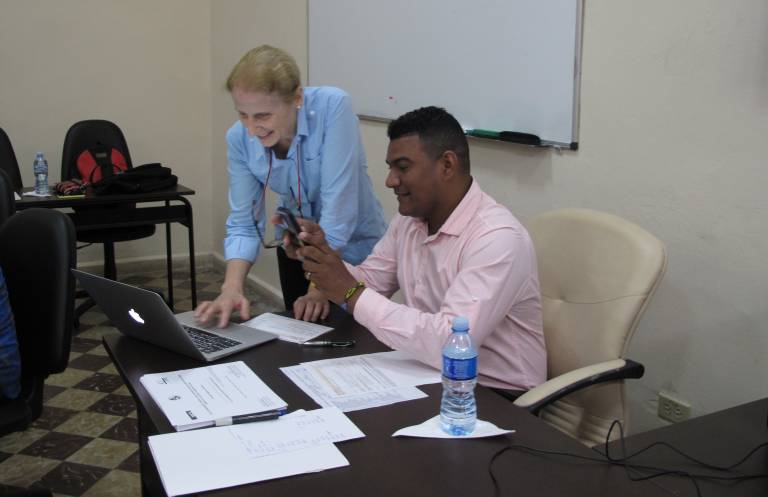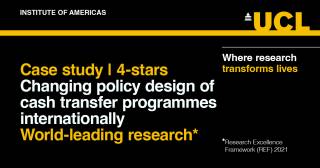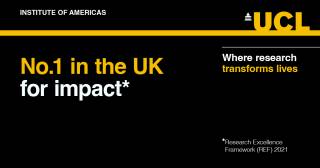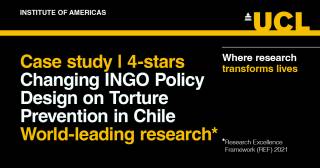
Ongoing projects | Concluded projects
Digital Technologies and Memory: Promoting Accountability for Past Atrocities in South America
- PI: Dr Francesca Lessa
- UCL/Research England Policy Support Funding
- 1 Dec 2023 to 31 Jul 2024
This project extends existing research activities by UK and South American-based academics and civil society activists with significant policy dimensions in deepening capacity to promote policies of memory and accountability for past human rights violations. Prior impact funding permitted the creation of plancondor.org in 2022. This open-access and multi-language website compiles previously scattered resources – from archival documents and criminal verdicts to interactive maps and timelines – on human rights violations in South America for numerous stakeholders, including civil society activists, lawyers, judicial professionals, policy makers, journalists, and academics. Since late 2022, the website has been accessed by over 22,000 users from 20 countries. The project deepens the existing collaboration with Proyecto Sitios de Memoria Uruguay and Londres 38 Chile to take further prior work. Further, additional intended partners include Chile-based activists, lawyers, judicial professionals, policy makers, journalists, and academics.
The project’s two main aims are (i) co-producing and co-developing policy-related materials, specifically a good practices toolkit on digital technologies and memory, and (ii) holding a user-led knowledge exchange workshop, to gather helpful insights to adjust plancondor.org to the requirements of our target stakeholders to deepen their capacities to use digital resources as part of their human rights work.
The Health Care Closet: Sexual Politics and American Health, 1965-1995
- PI: Professor Jonathan Bell
- Leverhulme Trust Major Research Fellowship
- 1 Sep 2022 - 31 Aug 2024
What impact did the lack of a health care system available to all have on the sexual revolutions in the United States of the post-1960s era? This project explores how the development of a valorised private sector in health care financing interacted with a parsimonious welfare system to shape how sexual minorities saw themselves – and each other – as political subjects in the 1970s and 1980s United States. Considering sexual minority rights together with the crisis in health care access, I examine the interactions of LGBTQ rights with state and private health politics. The project stakes a new claim to the importance of the sexual rights question in understanding the broad direction of political economy in the transition from welfare liberalism to free market fundamentalism and understand how the development of a valorised private sector in health care financing interacted with a limited and parsimonious welfare system predicated on categories of ‘deserving’ poor to shape the ways in which sexual minorities saw themselves – and each other – as political subjects.
The sexual liberation movements of the late twentieth century, both in the United States and elsewhere, were centred on sexual and bodily autonomy, but the US was distinctive in its reliance on a health care marketplace to realise full sexual citizenship. As a result, the sexual awakenings of the 1960s and 1970s rights revolutions created their own class dynamics and interacted with both state and private interests in ways that remain poorly understood. I will explore the relationship between sexuality and the politics of the US’s hybrid public private health care system from the end of the 1960s to the 1990s. In addition to considering the inequalities in access to health care intrinsic to such a system, I analyse the multiple ways it shaped the formation of sexual identities and then connected to larger understandings of political economy and society in ways distinct from other polities with publicly funded health care and more generous social safety nets. Sexual minorities demanded health care rights at the very point both public and private social safety nets in the US were coming under severe strain as part of what is now understood as a ‘neoliberal’ turn in global political economy. Therefore, the project’s consideration of an emerging crisis in health care access through the lens of sex and gender offers suggestive insights into the impact of market economics on sexual identity and activism at a critical point in the reshaping of political economy in the United States.
José Carlos Mariátegui: A New Biography
- PI: Professor Paulo Drinot
- Leverhulme Trust Major Research Fellowship
- 1 Oct 2021 - 30 Sep 2024
José Carlos Mariátegui (1894-1930), Latin America’s leading Marxist thinker in the aftermath of the Russian Revolution and founder of the Peruvian Communist Party. Seen today as a forefather of the revolutionary movements of the 1960s but also of contemporary indigenous and New Left movements, his writings attract increasing attention. An autodidact, he was a major intellectual figure of the early twentieth century. This project will pay particular attention to what the study of Mariátegui’s life can tell us about the historical processes that he lived through and to some extent helped to shape, namely (i) the emergence of a transnational cultural avant-garde in the 1920s, (ii) the reframing of the labour question in the wake of the Russian Revolution, and (iii) the early history of global communism.
The Visible Crown: Queen Elizabeth II and the Caribbean, 1952 to the present
- Co-I: Dr Kate Quinn | Postdoctoral Research Fellow: Dr Grace Carrington
- Arts and Humanities Research Council (AHRC)
- 1 Aug 2021 - 31 Jan 2026
In November 2021, fifty-five years after independence, Barbados will transition from a constitutional monarchy to a Republic. Barbados is the fourth Commonwealth Caribbean nation to remove the Queen as head of state, joining fellow republics Guyana (1970), Trinidad and Tobago (1976) and Dominica (1978). Nonetheless, Elizabeth II remains head of state in eight Caribbean countries. Why has Barbados succeeded in de-linking from the Crown (and why now) where other Caribbean states have failed? To what extent is there political will or popular support to effect such a change elsewhere? What factors can explain the surprising continuity of the Crown in the region? How have attitudes towards monarchy, and to Elizabeth II, changed over time?
With specific reference to Elizabeth II, whose reign encompasses the period from decolonisation to the present day, the project will interrogate both the political and the cultural significance of the monarch (as a person) and the Crown (as an institution), stimulating broader questions about relations between Britain and its former colonies, and about the dynamics of decolonisation, not as an achieved end, but as an ongoing process. These issues have been particularly acute in the Caribbean where a history of slavery, indentureship and colonialism coexists, in the form of persistent links to the Crown, with real material and symbolic connections to the former colonial power. With the transition of Barbados to republican status in 2021, has ‘time come’ for the Crown in the Caribbean?
The project brings together scholars from universities in the UK (City, UCL, SAS, Southampton) and the University of the West Indies. It will work with partners in the UK and the Caribbean to deliver a range of impact activities including policy briefings (FCO); community events (University of the West Indies Museum, National Caribbean Heritage Museum, Black Cultural Archives); teacher-training and the production of educational materials (Historical Association and Historic Royal Palaces); an exhibition (the UWI Museum); and a television documentary exploring the Queen in the Caribbean. Two major conferences will be held at City University and at the University of the West Indies, Cave Hill. Find out more about this research project here.
Building Research Capacity in Latin America: Workshops to Improve Publishing in Multidisciplinary Journals
Professor Paulo Drinot (CO-I) is working with Professor Patience Schell (PI, University of Aberdeen) and colleagues at Cambridge and Oxford on a series of workshops funded by the British Academy and the Social Science Research Council to bring together early career researchers and senior scholars from partner institutions across Latin America with current and former editors of the Journal of Latin American Studies to develop work-in- progress, build research networks and offer training in grant writing. The workshops respond to the applicants' and participants' experience that journal submissions to multidisciplinary journals from scholars based in Latin America are less often sent out for review and ultimately published. While many Latin American countries are seeking to improve the quality of social science and humanities research by giving incentives to publish in major international journals, governments and universities have not developed systems to train researchers to meet this goal. These workshops will address the barriers to publication, helping early career researchers based in Latin America develop their skills, improve a target project for publication, increase their understanding of publication in English-language journals and foster new research partnerships.
Taxation and the Persistence of Inequality
In this project, Dr Néstor Castañeda (UCL Institute of the Americas), Dr David Doyle (University of Oxford) and Dr Cassilde Schwartz (Royal Holloway, University of London) link the persistence of inequality in contemporary Latin America to the tax side of the fiscal contract and explain why tax structures have largely remained unchanged or, in some cases, have become more regressive. This project has been partially funded by the British Academy/Leverhulme Fund and the LAC Oxford/CAF Development Bank of Latin America Research Fund to run a number of survey experiments in Colombia and Mexico. They have recently presented the results of these experiments at the American Political Science Association Annual Conference, the European Political Science Association Annual Conference, and the REPAL Annual Conference.
Popularizing the Past: Historians, Publishers, and Readers in Postwar America
Dr Nick Witham's research project on American historical writing since the Second World War has been funded by the British Academy, the UK-US Fulbright Commission, the AHRC, the John Hope Franklin Center at Duke University, and the Institute for Advanced Studies in the Humanities at the University of Edinburgh. A book manuscript resulting from the project is under advanced contract with the University of Chicago Press. At its heart is an exploration of the authorship and reception of significant and widely read popular histories published between the 1940s and the 1990s by American historians Daniel Boorstin, John Hope Franklin, Richard Hofstadter, Gerda Lerner, and Howard Zinn. In highlighting the distinct contexts in which this public-facing scholarship was able to flourish, the project furthers our understanding of the public functions of humanities scholarship in an era when demands are regularly made for "impact" on society outside of the academy.
Transforming Cash Transfers
 |  |
Cash transfers are a form of income support usually consisting of monthly payments of cash to the poorest households in the global South. Despite the success of cash transfer programmes in reducing poverty, limitations in their design and implementation restrict their effectiveness and inclusiveness. Led by Professor Maxine Molyneux, and undertaken on behalf of the Overseas Development Institute, the ‘Transforming Cash Transfers’ (TCT) project was commissioned by the Department of International Development (DFID) to investigate 5 cash transfer programmes in the Middle East and Africa.
The resulting studies have impacted DFID’s development assistance programmes and have also helped shape the research and policymaking of NGOs and development consultancies such as Ladysmith and Oxford Policy Management, and UN agencies such as UNICEF and the UN Food and Agriculture Organisation.
Torture Prevention in Latin America
 |  |
Dr Par Engstrom, together with Dr Thomas Pegram (UCL Institute of Global Governance) are currently developing a political and socio-legal study of the evolution of torture and other ill-treatment in Latin America, with a particular focus on what factors have contributed to that evolution and the external influence of international prohibition frameworks. Initially part of a major global study on the impact of torture prevention interventions funded by the Association for the Prevention of Torture, the research draws on both qualitative and available quantitative data through a mixed method research design with the aim to present a highly contextualised picture of measures and mechanisms which contribute to lessening the risk of torture and other ill-treatment.
Consultancy for the Association for the Prevention of Torture by Dr Engstrom has impacted the organization’s policy design, as well as leading to changes in the practice of public and judicial officials in Chile. In the autumn of 2020, this project was included in the UCL Sustainable Development Goals agenda [Goal 16: Promote just, peaceful and inclusive societies]
Sex change in 20th century Argentina
This EU-funded project, undertaken by Dr Patricio Simonetto, will analyze the making of trans* bodies in twentieth-century Argentina. It has three goals: to investigate the history of a repertoire of medical and social embodiment practices; to examine transformations in the notion of 'sex'; and to establish a connection between trans* embodiment practices and gender-normative technologies performed for cissexual men and women. Unlike countries where 'sex change' was restricted or existed in a legal vacuum, Argentina prohibited surgeries that affected reproductive organs and punished public display of attributes of the 'other sex'. As a consequence, these procedures became clandestine, expensive and dangerous. By analyzing documents such as trial records and using oral history techniques, a first book will be written of the trans* body making in Argentina. More information here.
Latin American Studies Journals in the Twentieth and Twenty-First Centuries: the UK and the Brazilian experiences
This project, funded by a Newton Mobility Grant, is a collaboration between Professor Marcos Cueto of the Casa Oswaldo Cruz in Rio de Janeiro and Professor Paulo Drinot. The aim of this project is to strengthen and expand collaboration between UK and Brazilian academic communities and in particular to enhance the research capacity of both UK and Brazil based scholars in the field of Latin American studies through exchange of knowledge, skills and expertise in relation to the editing, management and publishing of academic journals in order to support excellent research, and its dissemination, in both Brazil and the UK, and more generally. The project includes reciprocal visits to the UK and Brazil with lectures and meetings aimed at facilitating knowledge and skills transfer and the organization of a workshop at the end of the project which will involve editors of other UK based and Latin America-based journals of Latin American studies.
Inter-American Human Rights Network
Coordinated by Dr Par Engstrom, and initially funded by the Leverhulme Trust, the Inter-American Human Rights Network (IAHRN) is an international research project which seeks to examine the development and impact of the regional human rights system of the Americas. The Network's principal purpose is to foster and coordinate collaborative research into the operations, structure, policies, rulings and recommendations of the Inter-American Commission and Inter-American Court, which together make up the Inter-American Human Rights System (IAHRS).
Westminster in the Caribbean: history, legacies, challenges
The Westminster in the Caribbean network seeks to address the urgent need for an expanded and updated analysis of the experience of Westminster in the Caribbean. As part of the network, UCL Institute of the Americas and the University of the West Indies ran a series of conferences to consider how the political model inherited from Britain was adapted to the conditions of the Caribbean, its impact on Caribbean democracy and the challenges the model has faced over the period of independence. A number of publications have arisen from the network's activities including a special issue of the Journal of Commonwealth and Comparative Politics on 'Westminster in the Caribbean Revisited' and the edited volume Beyond Westminster in the Caribbean (2018) by the network coordinators Brian Meeks and Kate Quinn. The network encourages dialogue across a number of borders to bring new insights to critical debates about the evolution and perceived decline of democracy in the region.
Improving mobility, quality of life, and accessibility for disadvantaged communities in Havana.
This transdisciplinary project, led by Dr Morris, involved a team from UCL’s Development Planning Unit and department of Civil, Geomatic and Environmental Engineering, in collaboration with partners from the technological university of Havana, known as CUJAE. Over six years from 2016-2022, a programme of activities, designed in response to needs identified by our colleagues from CUJAE’s faculty of architecture and urbanism, provided research input and technical support for a new vision for sustainable urban mobility in Havana. As well as participating in many seminars, meetings and conferences, the project team hosted public engagement events (for example, Mi Plaza es Mas) and workshops, and developed a series of pilot projects, securing the confidence and active engagement of Havana’s transport authority (Dirección General de Transporte, DGT) and other institutions as they prepared the city’s mobility strategy.
Additional funding was obtained for inter-disciplinary research and inter-agency engagement on related issues including climate finance for mitigation in transport, ‘technology foresighting’ (a review of low-carbon public transport options), street network analysis, and the impacts of transport on health. This all helped the DGT to secure EU funding to draw up the city’s new ‘Sustainable Urban Mobility Plan’ (SUMP). Despite Cuba’s severe financial constraints, the first steps of the Plan are now being implemented, with a new emphasis on active travel, safety, urban liveability, equity and accessibility.
 Close
Close

